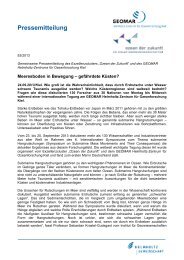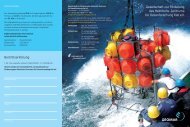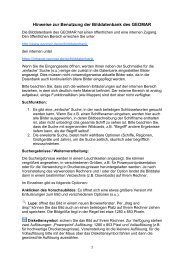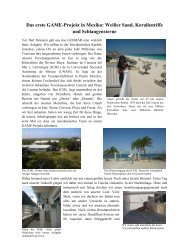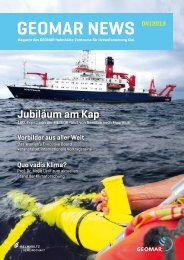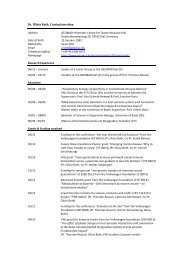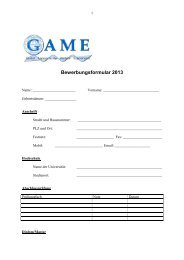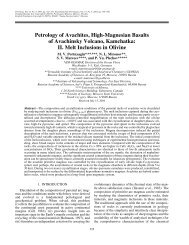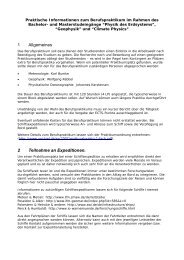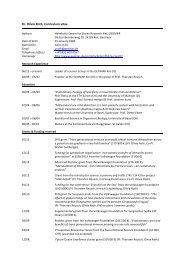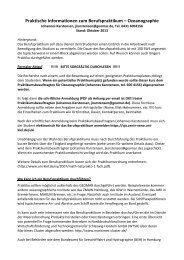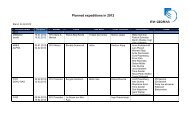WHAT IS GAME? - Geomar
WHAT IS GAME? - Geomar
WHAT IS GAME? - Geomar
Create successful ePaper yourself
Turn your PDF publications into a flip-book with our unique Google optimized e-Paper software.
GLOBAL<br />
APPROACH BY<br />
MODULAR<br />
EXPERIMENTS<br />
A WORLDWIDE PROGRAMME<br />
STUDYING GLOBAL CHANGE<br />
<strong>GAME</strong> supports and links<br />
young marine scientists.
( 3<br />
HAND IN HAND<br />
WORLDWIDE<br />
<strong>GAME</strong> – A BRIDGE-BUILDING<br />
RESEARCH PROGRAMME<br />
»<br />
<strong>GAME</strong> stands for<br />
GLOBAL<br />
APPROACH BY<br />
MODULAR<br />
EXPERIMENTS<br />
?<br />
<strong>WHAT</strong> <strong>IS</strong> <strong>GAME</strong>?<br />
GEOMAR | Helmholtz Centre for Ocean Research Kiel is one of the world’s leading<br />
institutes in the field of marine science. It aims to study the oceans in<br />
their entirety and for this purpose the institute combines research in physics,<br />
chemistry, biology and geology under one roof. In 2002, Professor Martin<br />
Wahl initiated a special programme in the field of marine biology, establishing<br />
a new and innovative scientific approach:<br />
<strong>GAME</strong> – a programme for the worldwide implementation of identical<br />
experiments across geographical and climatic boundaries.<br />
<strong>GAME</strong>-research projects study the effects of global change on habitats in<br />
coastal waters.<br />
<strong>GAME</strong> is in an international training programme that combines applied research<br />
with training for young scientists. Every year, parallel research projects<br />
on current ecological issues are organised at different locations around<br />
the world. The research is carried out by students working in bi-national pairs<br />
and supervised by scientists from <strong>GAME</strong>’s partner institutes.<br />
The unique <strong>GAME</strong> projects enable generalizable insights into urgent ecological<br />
issues. At the same time <strong>GAME</strong> links GEOMAR with numerous partner institutes<br />
worldwide and creates a global network for the sustainable exchange<br />
of scientific knowledge. <strong>GAME</strong> currently cooperates with 33 marine research<br />
institutes on five continents.<br />
This network is growing.<br />
»<br />
The <strong>GAME</strong> programme promotes its participants’ intercultural competence,<br />
making an important contribution to open, unprejudiced and interested<br />
engagement with other cultures in order to learn, work and research<br />
together<br />
Kerstin Bockhorn, <strong>GAME</strong> participant from Germany, now employed as an<br />
Environmental Scientist with the municipal Office for Nature and Resource<br />
Conservation in Hamburg
( 5<br />
NETWORKS FOR<br />
THE OCEANS<br />
A PROGRAMME FOR THE FUTURE<br />
THAT NEEDS PARTNERS<br />
?<br />
<strong>WHAT</strong> ARE THE AIMS OF <strong>GAME</strong>?<br />
<strong>GAME</strong>’s primary aim is to study the effects of global change on the earth’s<br />
coastal habitats. Furthermore, <strong>GAME</strong> works to develop and expand the multinational<br />
transfer of knowledge, in particular between industrialized and<br />
newly industrializing countries, as well as creating lasting and sustainable<br />
networks for marine research. At the same time <strong>GAME</strong> supports young scientists<br />
and in intensive teaching modules trains them in scientific core skills,<br />
such as the communication of research findings in the form of scientific articles<br />
and talks.<br />
<strong>GAME</strong> needs support for this work.<br />
WAYS IN WHICH YOU CAN SUPPORT US<br />
With a partnership<br />
you can enable <strong>GAME</strong> to con tinue its successful international<br />
cooperation and to pursue and develop excellent teaching within<br />
the programme (teaching, stu dent supervision, network<br />
expansion, publicity). You deci de the amount of your contribution<br />
to support <strong>GAME</strong>.<br />
With a sponsorship<br />
you give an individual student the opportunity to participate in an<br />
exchange as part of the <strong>GAME</strong> project. With a fixed sum you can<br />
fund a scholarship for one stu dent (travel costs, equipment,<br />
books, media).<br />
We are looking for businesses, individuals and foundations willing to become<br />
involved as partners or sponsors for future projects:<br />
You would like to support sustainable marine research?<br />
You would like to support young scientists?<br />
You would like to be part of a cultural and scientific competence network?<br />
<strong>GAME</strong> provides opportunities – for its partners and sponsors:<br />
Your benefits as a partner or sponsor<br />
›<br />
›<br />
›<br />
›<br />
›<br />
Personal, exclusive invitations to <strong>GAME</strong> events<br />
Personal contact and opportunities for communication with<br />
scientists and institutions<br />
You can experience research “close up”<br />
Your name will be mentioned in <strong>GAME</strong> publicity<br />
You will be linked with an international research network<br />
We are happy to send detailed<br />
information on request.
( 7<br />
GLOBAL THINKING<br />
MODULAR RESEARCH<br />
IN A WORLDWIDE NETWORK FOR<br />
SCIENTIFIC EXCHANGE<br />
? HOW DOES <strong>GAME</strong> WORK?<br />
Currently 18 scholarships are awarded annually, divided equally between<br />
German and foreign students who are writing their final thesis in the framework<br />
of a research project<br />
›<br />
›<br />
›<br />
›<br />
›<br />
›<br />
›<br />
Every <strong>GAME</strong> project begins in Kiel.<br />
Every year in March all participants meet here and develop the<br />
methodological approach for their new research project in a monthlong<br />
preparatory course, together with scientists from GEOMAR.<br />
The participants form bi-national teams consisting of one German<br />
and one local student and perform the experiments at one of our<br />
partner institutes from April on.<br />
At the beginning of September the German students return to Kiel,<br />
where they evaluate their data and write their final theses with the<br />
support of GEOMAR scientists.<br />
Subsequently the foreign students return to participate in the<br />
global evaluation of the experimental results.<br />
This is followed by a phase with intensive training modules on<br />
delivering scientific lectures and preparing publications.<br />
In the last phase of each project the participants present their<br />
findings in the form of lectures at universities and marine science<br />
institutes in northern Germany, and prepare articles for scientific<br />
journals.<br />
» <strong>GAME</strong> combines the implementation of an innovative, global research<br />
approach with the education of promising young scientists and in this<br />
way provides a model for the ideal combination of scientific research and<br />
broadly defined academic education.<br />
Dr. Bernhard Lorentz<br />
President of Stiftung Mercator
( 9<br />
COMPETENCE THROUGH<br />
COOPERATION<br />
<strong>GAME</strong> SUPPORTS CAREERS – AND HELPS TO<br />
SECURE THE FUTURE OF COASTAL REGIONS<br />
!<br />
<strong>GAME</strong>’S STRENGTHS<br />
›<br />
›<br />
›<br />
›<br />
›<br />
›<br />
›<br />
unique scientific approach<br />
high relevance due to generalizable research results<br />
high quality due to small numbers of participants<br />
<strong>GAME</strong> is a global tool that can serve as a model for other disciplines<br />
high level of attractiveness through its utilization of the<br />
competence and logistics of GEOMAR<br />
networking of participants and partner institutes<br />
global transfer of knowledge<br />
<strong>GAME</strong> promotes<br />
› understanding of global issues and research approaches<br />
› intercultural competence and teamwork skills<br />
› exchange of knowledge, cosmopolitanism and tolerance<br />
qualification for scientific work at an international level<br />
›<br />
<strong>GAME</strong> offers<br />
› an excellent education with intensive and individual supervision<br />
› efficient training for optimum career prospects<br />
research experience abroad before starting a doctoral project<br />
training in practical work at difficult research locations<br />
›<br />
›<br />
» There is no other way to say it: <strong>GAME</strong> has changed my life. This global project<br />
gave me a rigorous formal training of quantitative analysis of spatial<br />
and temporal dynamics in benthic marine communities. I am currently a<br />
postdoctoral fellow in Edgewater, Maryland, USA, working with the effects of<br />
pollution and latitude on native and invasive species. <strong>GAME</strong> showed me the<br />
right way and gave me the tools I needed for the path I chose.<br />
Dr. João Canning-Clode, <strong>GAME</strong>-participant from Madeira / Portugal<br />
currently Smithsonian Research Fellow
( 11<br />
THE WORLD POSES<br />
QUESTIONS<br />
THE <strong>GAME</strong> NETWORK IN FIGURES<br />
!<br />
›<br />
<strong>GAME</strong> FINDS ANSWERS – IN THE OCEANS<br />
Using the findings from many comparable individual studies, <strong>GAME</strong> participants<br />
draw conclusions that are transferable and universally applicable.<br />
The oceans contain the greatest variety of species on earth, but are much less<br />
well researched than terrestrial habitats. They are of tremendous significance<br />
as a source of organic and non-organic resources and as a climate buffer.<br />
<strong>GAME</strong> concentrates on the coastal regions of our planet, as they are of paramount<br />
importance for humanity: They store major food resources, provide<br />
carbon dioxide sinks and stabilise coastal lines.<br />
Already, more than 50 % of the world’s population live close to the sea and this<br />
percentage is rising continually. For this reason, coastal seas are most affected<br />
by global change, as climate warming, rising sea levels, species transfers<br />
and intense human use all come together here. This can have far-reaching<br />
consequences for the ways in which these ecosystems function.<br />
<strong>GAME</strong> studies the effects of global change on these habitats of major significance<br />
to mankind.<br />
Several projects, for example, have studied factors influencing biodiversity.<br />
<strong>GAME</strong> is also interested in issues in invasion ecology and studies the ways<br />
in which environmental changes affect the interrelations between species.<br />
Information on <strong>GAME</strong>’s research projects is available at<br />
www.geomar.de/go/game<br />
Our network currently includes 33 research institutions in 24 countries. We<br />
are represented on five continents and thus in all of the large marine areas.<br />
So far 129 students have been supervised by <strong>GAME</strong>. The German participants<br />
came from 25 different universities throughout the country. To date, 36 publications<br />
based on <strong>GAME</strong> projects have appeared in international peer-reviewed<br />
scientific journals.<br />
»<br />
In the field of marine ecology, <strong>GAME</strong> provides an example of the genuine<br />
and sustainable transfer of technology and knowledge from the “North”<br />
to “newly industrializing countries”. The programme also raises young<br />
German scientists’ awareness of the problems and difficulties of the<br />
partner countries.<br />
Nikolaus Gelpke, Marine biologist<br />
Publisher of the journal MARE and member of the <strong>GAME</strong> board of trustees
12<br />
)<br />
GEOMAR | Helmholtz Centre for Ocean Research Kiel<br />
<strong>GAME</strong> programme<br />
Duesternbrooker Weg 20<br />
24105 Kiel<br />
www.geomar.de/go/game<br />
<strong>GAME</strong> – Programme coordinator<br />
Dr. Mark Lenz<br />
Telefon: +49 431-600-4576<br />
Telefax: +49 431-600-1671<br />
E-Mail: mlenz@geomar.de<br />
<strong>GAME</strong> – Head of the programme<br />
Prof. Dr. Martin Wahl<br />
Telefon: +49 431-600-4500<br />
Telefax: +49 431-600-1671<br />
E-Mail: mwahl@geomar.de



